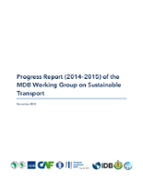Progress Report (2014-2015) of the MDB Working Group on Sustainable Transport
Date
Dec 2015
1. In the third year of the Multilateral Development Banks¿1 (MDBs) Joint Statement of 2012, our eight MDBs are on target to meet the goal of the Commitment to Sustainable Transport (hereafter the Rio+20 Commitment) to provide more than $175 billion of loans and grants for transport in developing countries over the coming decade (2012-2022). Collectively, in 2014, about $20 billion of new funding for transport projects was added to the $20 billion approved in the first year of our Commitment (2012) and $25 billion approved in 2013. 2. This $20 billion in funding comprised more than 193 approvals. 2 including: 103 for roads, 32 for urban transport , 14 for rail; 9 for airports. 6 for inland waterway and maritime projects, 29 for other transport projects. 3. In addition, more than 192 technical assistance (TA) projects were approved to support policy development, research and capacity building. 4. Increasingly, our MDBs are supporting more sustainable types of transport projects¿transport that is accessible, affordable, efficient, financially sustainable, environmentally friendly, and safe. Under a common reporting framework, our institutions have continued to make progress in assessing the sustainability of our transport lending in economic, social, and environmental terms. 5. In 2014, all MDBs completed an assessment of the sustainability of our entire annual transport lending, up from four MDBs in the year before. ADB used the Sustainability. Appraisal Rating Framework (STAR) while six MDBs used a modified version of STAR. WB used its own internal methodology. For MDBs that applied STAR or a modified STAR, a common four-point scale was used although the results are not yet fully comparable. Further efforts will be made to improve the comparability of ratings between the MDBs in the future. 6. The MDB Working Group on Sustainable Transport (WGST) identified quantitative indicators of project outputs and outcomes that can be used to complement the sustainability assessment. In this regard, relevant output and outcome indicators with readily available data are reported in the ¿In numbers¿ feature of each MDB, e.g. kilometer (km) of roads built or upgraded, km of railways built or upgraded, volume of transport mitigation investment, and percentage of road projects with road safety components. Discussions are ongoing to further harmonize reporting on indicators. 7. The year 2015 marks several important milestones in the international dialogue on development which are directly relevant to sustainable transport. These include completion of the 2030 Agenda for Sustainable Development and adoption of the new Sustainable Development Goals (SDGs), the 21st Conference of the Parties to the United Nations Framework Convention on Climate Change, and the Second Global Ministerial Conference on Road Safety to mark the mid-point of the United Nations Decade of Action for Road Safety. 8. The newly approved SDGs are expected to raise the attention given to addressing the different dimensions of sustainable transport, which will be conducive to the role of MDB-financed sustainable transport projects and programs. Our MDBs expect to take part in the process of deciding the indicators to be used for tracking progress on meeting the SDG targets and will make efforts to incorporate the indicators in our work.



